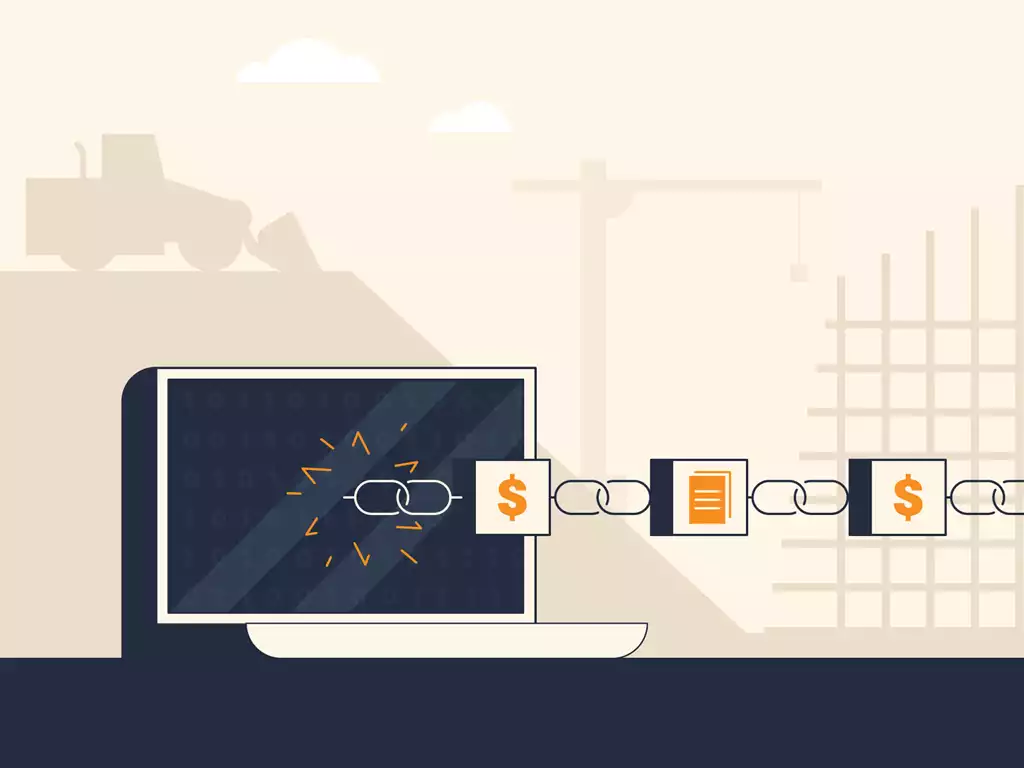Blockchain technology in construction refers to the application of decentralised, secure, and transparent digital ledgers to streamline various aspects of the industry. By utilizing blockchain, construction projects can enhance transparency and traceability across the supply chain, from procurement to project completion. Smart contracts enable automated verification and execution of agreements, reducing disputes and delays. Immutable records stored on the blockchain ensure data integrity, improving project management, and compliance with regulations. This technology fosters collaboration among stakeholders by providing a single source for project documentation and transactions, thereby potentially reducing costs and enhancing efficiency throughout the construction lifecycle.
How does blockchain technology work?
Blockchain technology works by creating a decentralised and distributed digital ledger that records transactions across a network of computers. Here’s a step-by-step explanation of how blockchain technology works in construction.

Data Entry and Initiation: Stakeholders enter project data, including contracts, procurement details, and certifications, into the blockchain network.

Transaction Verification: The blockchain network validates the accuracy and authenticity of transactions through consensus mechanisms like Proof of Work or Proof of Stake.

Creation of Blocks: Valid transactions are grouped into blocks, each containing a timestamp, a cryptographic hash of the previous block, and transaction data.

Blockchain Consensus: Nodes in the network agree on the validity of transactions and the order in which they are added to the blockchain, ensuring decentralized consensus.

Immutable Storage: Once added, blocks are linked together in a chain and stored immutably. Data on the blockchain cannot be altered without network consensus, ensuring security and transparency.

Smart Contracts Execution: Blockchain platforms like Ethereum use smart contracts to automate and enforce contractual agreements, such as payment releases based on project milestones.

Supply Chain Transparency: Blockchain enables transparent tracking of construction materials throughout the supply chain, ensuring authenticity, quality, and compliance.

Document Management: Project documentation, such as contracts and permits, is securely stored and managed on the blockchain, reducing paperwork and ensuring data integrity.

Enhanced Security: Cryptographic techniques secure transactions and data, providing secure access and protecting against unauthorized tampering or access
By following these steps, blockchain technology enhances transparency, efficiency, and security in construction projects, optimizing processes across the industry.
Advantages of blockchain technology for construction industry
- Provides a transparent and auditable record of transactions and project activities.
- Ensures that data stored on the blockchain cannot be altered or tampered with, enhancing data integrity.
- Minimizes the risk of fraud by securely verifying transactions and identities.
- Facilitates faster and more secure payment processes through smart contracts, reducing delays and disputes.
- Enables transparent tracking of materials and products throughout the supply chain, enhancing efficiency and reducing costs.
- Provides a single source of truth for project documentation and communication, reducing administrative overhead.
- Automates contract execution and enforcement based on predefined conditions, reducing reliance on intermediaries and improving contract performance.
- Helps identify and mitigate risks earlier in the project lifecycle through better data visibility and tracking.
- Speeds up dispute resolution by providing clear, tamper-proof records of contractual agreements and project milestones.
- Improves asset lifecycle management by securely storing maintenance histories, warranties, and ownership records on the blockchain.
- Encourages collaboration among project stakeholders by providing a shared platform for real-time updates and approvals.
- Reduces paperwork and manual document handling by securely storing and managing project documents on the blockchain.
- Enhances data security by employing cryptographic techniques to protect sensitive information from unauthorized access.
- Reduces costs associated with paperwork, administrative tasks, disputes, and delays, leading to overall project cost savings.

Types of blockchain technology used in construction industry
1. Public Blockchains: Public blockchains are decentralized networks where transactions are transparent and accessible to anyone. They operate on a consensus mechanism that ensures data integrity without the need for a central authority. In construction, public blockchains like Ethereum can facilitate transparent payment processes, track project milestones, and securely store project documentation. They provide an immutable ledger that enhances trust among stakeholders by preventing data tampering and ensuring the accuracy of records. However, public blockchains may pose challenges related to scalability and privacy, as all transaction details are visible to the public.
2. Private Blockchains: Private blockchains are operated by a single organization or a consortium of organizations with restricted access to authorized participants. These blockchains offer higher levels of privacy and control compared to public blockchains. In construction, private blockchains are used for intra-company projects or collaborations among specific stakeholders like contractors, subcontractors, and suppliers. They enable secure sharing of sensitive project information, such as proprietary designs, financial data, and contractual agreements, while maintaining confidentiality among authorized parties. Private blockchains are suitable for maintaining internal records, managing supply chain interactions, and ensuring compliance with industry regulations.
3. Consortium Blockchains: Consortium blockchains are semi-decentralized networks where multiple organizations share control over the blockchain infrastructure. They are governed by a consortium of stakeholders who collectively manage and validate transactions. Consortium blockchains are beneficial in construction for collaborative projects involving multiple parties such as developers, architects, engineers, and regulatory bodies. They provide a trusted environment for sharing project data, coordinating activities, and verifying compliance with contractual obligations. Consortium blockchains enhance transparency and accountability among consortium members while mitigating the risks associated with centralized control.
4. Permissioned Blockchains: Permissioned blockchains are similar to private blockchains but allow access only to authorized participants. They offer enhanced security and privacy features compared to public blockchains while retaining some degree of decentralization. Permissioned blockchains are suitable for construction applications requiring stringent data privacy and regulatory compliance, such as managing sensitive project documentation, intellectual property rights, and financial transactions. They provide a controlled environment where stakeholders can securely exchange information, automate business processes through smart contracts, and ensure auditability of activities without compromising data integrity.
5. Blockchain Platforms with Smart Contracts: Blockchain platforms like Ethereum support smart contracts, which are self-executing contracts with predefined rules and conditions written into code. In construction, smart contracts automate and enforce contractual agreements, such as payment schedules, project milestones, and compliance milestones. They streamline administrative processes, reduce the potential for disputes, and enhance trust among parties by ensuring transparent and verifiable execution of contractual obligations. Smart contracts on blockchain platforms facilitate efficient project management, real-time monitoring of activities, and seamless coordination among stakeholders throughout the construction lifecycle.
6. Supply Chain Blockchain Applications: Supply chain blockchain applications focus on tracking materials and products throughout the supply chain to ensure transparency, traceability, and authenticity. In construction, blockchain can verify the origin, quality, and compliance of materials used in projects, thereby reducing the risk of counterfeit products, improving procurement processes, and enhancing overall project efficiency. Supply chain blockchain applications enable stakeholders to monitor the movement of materials, manage inventory levels, and streamline logistics operations while maintaining a secure and auditable record of transactions.
7. Asset Management Blockchains: Asset management blockchains are used for managing the lifecycle of construction assets, including equipment, machinery, and buildings. They store maintenance records, warranty information, ownership details, and operational data securely on the blockchain. In construction, asset management blockchains improve transparency and accountability by providing stakeholders with real-time access to asset information, facilitating proactive maintenance scheduling, optimizing asset utilization, and reducing downtime. They enhance asset tracking, mitigate risks associated with asset ownership, and support regulatory compliance by ensuring accurate and auditable documentation throughout the asset lifecycle.

Applications of blockchain technology in construction
Blockchain technology has several applications in the construction industry, leveraging its capabilities to enhance transparency, efficiency, and security across various processes. Here are key applications of blockchain technology in construction:
1. Supply Chain Management: Blockchain can track the origin, authenticity, and movement of construction materials throughout the supply chain. This ensures transparency, reduces the risk of counterfeit products, improves procurement processes, and enhances overall supply chain efficiency.
2. Payment Processing: Blockchain facilitates secure and transparent payment processes through smart contracts. It automates payment releases based on predefined project milestones or contractual agreements, reducing disputes and delays associated with traditional payment methods.
3. Project Management: Blockchain provides a decentralized and immutable ledger for project documentation, including contracts, permits, and certifications. It improves document management, ensures data integrity, and facilitates real-time access to project information for stakeholders.
4. Smart Contracts: Smart contracts on blockchain automate and enforce contractual agreements between parties involved in construction projects. They enable self-executing contracts based on predefined conditions, reducing the need for intermediaries and enhancing contract performance.
5. Asset Management: Blockchain enhances asset lifecycle management by securely storing maintenance records, warranty information, and ownership details. It enables stakeholders to track equipment and machinery, schedule maintenance proactively, optimize asset utilization, and ensure compliance with regulatory requirements.
6. Quality Assurance and Compliance: Blockchain technology provides a transparent and auditable record of project activities, ensuring compliance with regulatory standards and quality assurance processes. It improves accountability, traceability, and documentation of inspections and certifications throughout the construction lifecycle.
7. Risk Management: Blockchain enhances risk management by providing stakeholders with real-time visibility into project data and potential risks. It enables proactive risk identification, mitigation, and contingency planning based on accurate and up-to-date information stored on the blockchain.
8. Collaboration and Communication: Blockchain fosters collaboration among project stakeholders by providing a single source of truth for project documentation and communication. It facilitates secure sharing of information, reduces communication barriers, and promotes efficient decision-making processes.
9. Dispute Resolution: Blockchain’s immutable records and transparent transaction history facilitate faster and more efficient dispute resolution processes. It provides clear evidence of contractual agreements, payments, and project milestones, reducing disputes and legal costs.

Challenges of adoption of blockchain technology in construction
Implementing blockchain technology in construction faces several challenges that need to be addressed for widespread adoption and effective integration into industry practices:
- Blockchain networks, especially public ones, can face scalability issues when handling large volumes of transactions typical in construction projects. Scaling solutions such as sharding or layer 2 protocols are being developed but need refinement for practical application.
- Many construction firms already have established legacy systems and processes. Integrating blockchain technology with these systems without disrupting ongoing projects and operations requires careful planning and may involve significant upfront costs.
- Blockchain technology is complex and requires specialized technical knowledge to implement and maintain. Finding skilled professionals who understand both construction operations and blockchain technology can be challenging.
- The legal framework surrounding blockchain technology, especially concerning smart contracts and digital transactions, is still evolving. Adapting existing regulations to accommodate blockchain applications in construction poses legal challenges and may require legislative updates.
- While blockchain offers robust security features, ensuring the privacy of sensitive project data remains critical. Implementing adequate data encryption and access controls without compromising transparency is a delicate balance.
- Initial setup costs for blockchain infrastructure and ongoing maintenance expenses can be substantial. Construction firms need to assess the potential ROI of implementing blockchain technology in terms of efficiency gains, cost reductions, and risk mitigation.
- Different blockchain platforms may not be compatible with each other, leading to interoperability challenges when multiple stakeholders use different systems. Standardization efforts are ongoing but require industry-wide collaboration.
Conclusion
Blockchain technology holds immense promise for the construction industry by streamlining transparency, efficiency, and security. As construction firms increasingly adopt blockchain solutions, they stand to benefit from streamlined operations, reduced costs, and enhanced project outcomes. While challenges like scalability and integration with existing systems remain, the potential of blockchain to streamline construction practices and pave the way for a more transparent and efficient industry is undeniable.





